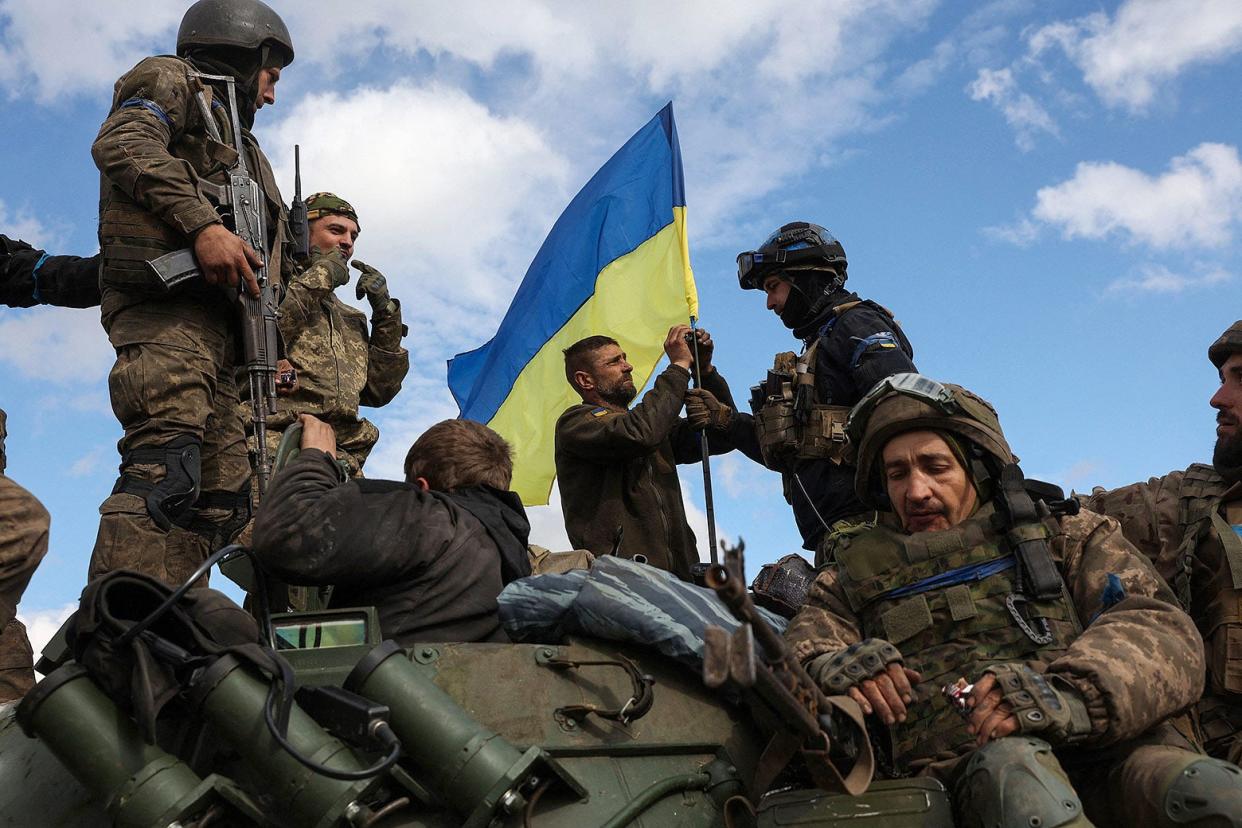No, Biden Hasn’t Messed Up an Opportunity to End the War in Ukraine

- Oops!Something went wrong.Please try again later.
- Oops!Something went wrong.Please try again later.
- Oops!Something went wrong.Please try again later.
Did President Joe Biden miss an opportunity to end the war in Ukraine diplomatically nine months ago? Some commentators and at least one U.S. official are starting to think he might have.
I disagree.
The queasy feeling was first articulated last week in a Politico article that recalled a speech last November by Gen. Mark Milley, chairman of the joint chiefs of staff. The war was getting brutal, both sides had suffered horrible casualties, civilians were under attack. On the very day of Milley’s speech, Russian troops were withdrawing from the southern port of Kherson, one of four Ukrainian regions that Russian President Vladimir Putin had formally annexed just two months earlier. As a result, Milley said, there might be “a window of opportunity for negotiations.”
Cut to the present day. The war slogs on, and the Ukrainian counteroffensive is going more slowly than many expected. U.S. intelligence analysts assess that Ukraine’s army may never accomplish its strategic objective of cutting off Russian troops from Crimea, much less retaking all of the occupied land in the eastern part of its country.
“Milley had a point,” Politico quoted an anonymous official as saying. “We may have missed a window to push for earlier talks.”
The general may have had a point about the state of the battle at the time (and in the next several months). But there is no evidence at all that Putin was ready—or open to any pressure—for a negotiated end to the war. In fact, there is plenty of evidence that he was not.
First, Russia’s retreat from Kherson made it less likely that Putin would respond favorably to a call for a negotiated settlement. Accepting such an offer would be tantamount to admitting defeat, which he regarded as an unacceptable outcome—both for his army and, very likely, his continued political rule in the Kremlin.
Second, two days before Milley’s speech, Ukrainian President Volodymyr Zelensky did offer a negotiated peace, saying he would order a cease-fire if Putin accepted five preconditions: restore Ukraine’s territorial integrity, respect U.N. resolutions on the war, pay to repair all damage caused by his missile strikes, punish war criminals, and promise not to invade Ukraine again.
Putin was unlikely to accept these conditions; Zelensky no doubt knew this and presented the offer to gain a moral high ground. But the proposal was intriguing for a demand it did not contain: Putin’s resignation. Just a month earlier, Zelensky had issued a decree barring any negotiations with Russia as long as Putin was in power. Now that bar was lifted. In any case, Putin did not even bother to issue a counteroffer; he simply ignored it. He was not interested in negotiations.
Third, Milley’s remarks have been somewhat misinterpreted. One of the lines from his speech has been widely quoted: “There has to be a mutual recognition that military victory is probably, in the true sense of the word, is maybe not achievable through military means. And therefore, you have to turn to other means”—i.e., a diplomatic solution.
However, the phase “there has to be,” read in context, did not mean “there must be.” Rather, Milley was stating a premise for negotiations—that both sides have to recognize that military victory is not achievable in order for talks to begin. If both sides do not recognize this, then the war will continue.
Now, it may be that Milley foresaw that military victory was unlikely. He drew comparisons with World War I in 1915, after senior officers recognized the stalemate but combatants kept fighting anyway. Just last week, he told the Washington Post that if the goal of the war is to restore Ukraine as a “free, independent, sovereign country with its territory intact,” that’s “gonna take a long, long time,” adding, “You can also achieve those objectives—maybe, possibly—through some sort of diplomatic means.”
However, he went on to note, “This counteroffensive hasn’t run its course yet. So we have to see where this thing ends up and then move from there.” Similarly, back in November, just after the widely (mis-)quoted line about whether victory was achievable, he said, “There’s one guy that can stop [the war], and his name is Vladimir Putin.” Until Putin decides to stop it and accepts Zelensky’s five preconditions for peace, “the United States is going to continue to support Ukraine in the fight for freedom.”
Even the official quoted by Politico stopped far short of declaring Milley’s warnings—to the extent they were warnings—as prophetic. As the article summarized:
The official also stressed, however, that few believe Moscow has been at all serious about negotiations since the war’s start. And no senior leader felt then, or feels now, that the counteroffensive was a mistaken play, considering how Ukraine maintains full support from the West and has had remarkable success throughout the war.
None of this is to suggest that the war is going swimmingly for Ukraine, or that victory is achievable, or that a negotiated settlement would be a bad idea if Putin were open to one. The problem, as Milley recognized at the time of his speech and continues to recognize now, is that Putin is not open. There was no missed opportunity. There still isn’t an opportunity.
The Politico article quotes another U.S. official saying the Biden Administration is increasingly asking itself this question: “If we acknowledge we’re not going to do this forever, then what are we going to do?” That is a legitimate question. From a standpoint of politics, policy, European security, and deterrence of aggression from all adversaries everywhere, it is the question on the table—and it’s a question that, at least in public discourse, almost everyone is evading.

